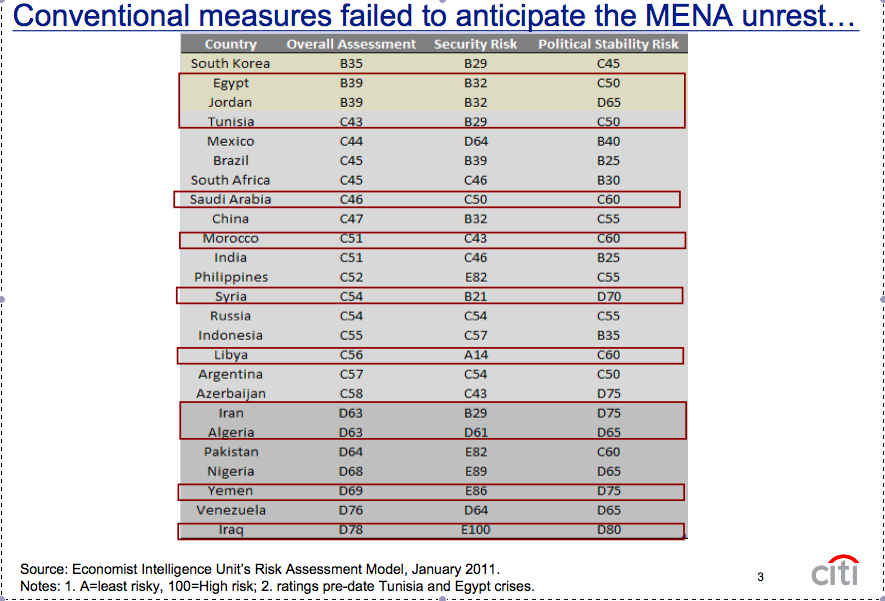Measuring political risk in emerging markets
Post on: 16 Март, 2015 No Comment

Measuring political risk in emerging markets
(Corrects to say EI Sturdza is UK investment firm, not Swiss)
Commerzbank analyst Simon Quijano-Evans recently analysed credit ratings for emerging market countries and concluded that there is a strong tendency to under-rate emerging economies that is they are generally rated lower than developed market equals that have similar profiles of debt, investment or reform. The reason, according to Quijano-Evans, is that ratings assessments tend to be blurred by political risk which is difficult to quantify and is usually higher in the developing world compared with richer peers.
However there are some efforts to measure political risks, and unfortunately for emerging economies, some of those metrics seem to indicate that such risk is on the rise. Risk consultancy Maplecroft which compiles a civil unrest index (CUI), says street protests, ethnic violence and labour unrest are factors that have increased chances of business disruption in emerging markets by 20 percent over the past three months. Such unrest as in Hong Kong recently, can be sudden, causing headaches for business and denting economic growth, Maplecroft says. Hong Kong where mass pro-democracy protests in the city-states central business district which shuttered big banks and triggered a 7 percent stock market plunge last month.
As a result, Hong Kong jumped to 70th place in the index from a relatively safe 132nd place in the CUI which analyses governance, political and civil rights and the frequency and severity of incidents to assess the current and future civil unrest picture.
Hong Kong performs comparatively well in the economic, social and rights factors in the CUI, but performs poorly for democratic governance, Maplecroft says:
The scale of the protests, which has cost retailers upwards of $283 million, has seen Hong Kong move from the medium risk category to high risk. Beijings response will be key to determining whether the situation deteriorates further.
Disease, global warming, economic disparities can also boost political risk. Ebola-ravaged Liberia rose to 74th place in the CUI, up from 113th, Maplecroft said, while Guinea (25th) and Sierra Leone (58th) have also seen violent protests related to Ebola. Nigeria fell six places in the ranking to 24th, Maplecroft said, predicting more unrest before elections next February
What do investors think? Few investors venture into the worlds most turbulent places such as Yemen or Syria of course. But companies and funds can be hard hit when problems erupt in financial centres such as Hong Kong or manufacturing hubs like Vietnam or Bangladesh as has happened this year. Mining companies such as African Minerals and London Mining, active in Ebola-hit West Africa, have seen share prices fall 80-90 percent this year. Still, most investors are confident about their ability to ride out the turbulence possibly because they have seen it all before. Diana Layfield, Standard Chartered Chief Executive for Africa told a briefing:
In the medium term this is not something we think will affect the business in a negative wayI may be an optimist here, but I think in the medium to long-term this is something we will get collectively get a grip of.
And Lilian Co, portfolio manager at UK investment firm EI Sturdza, sees the Hong Kong protests as causing merely short-term volatility for stock markets:
This may potentially be a buying opportunity for investors.














